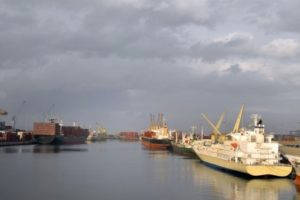
Ghana, a new entrant to the energy game, wants to provide them with a closer port of call.
Like many resource dependent countries, Ghana wants to grow its economy beyond raw material exports – and hopes a new port and rig repair depot will help it to do just that.
This year, groundbreaking begins on the Atuabo Free Port, a US$1 billion facility on the western side of Ghana’s coastline. Here, oil rigs will be towed to be serviced, saving the almost 10,000 nautical mile journey to the Far East where the work is usually carried out. Atuabo will also serve as a free trade port for energy-related industry.
The project is being driven by Lonrho, a UK-based corporation that has invested in African projects for more than a century. Lonrho and its investment partners will hold 55 percent of the venture, with another 35 percent taken up by Ghanaian investors; the government will have a stake of 10 percent.
In April, the China Harbour Engineering Company was awarded a $600 million contract for the project, which is sited 326 kilometres west of Ghana’s capital, Accra, and just 100km west of Takoradi, the centre of the country’s emerging oil industry.
Dedicated free trade ports are something of a fashion among developing economies which see them as a way to encourage investment.
Already other African countries have such facilities or are developing them, says the Atuabo development manager, Steven Gray. “These dedicated ports ensure that the needs of the oil and gas industry are addressed in a way that ensures efficiency and reduction of operating costs, and so will it be for Ghana,” Mr. Gray says. “Also the market assessment suggests substantial interest for a dedicated oil and gas freeport in Ghana. The pipeline of tenants on the project is very strong.”
Angola has its Sonils facility; Nigeria, the Onne oil and gas freeport, and South Africa is developing a rig repair depot at Saldanha Bay near Cape Town.
Atuabo intends to eventually become a regional hub for oil and gas companies operating in the area, with corporate, logistical and manufacturing facilities. Most rigs now must travel 20 days to South Africa for repairs, increasing costs and delays for upstream operators in the Gulf of Guinea, Mr. Gray says.
And because South Africa has port constraints, only a limited number of rigs can be accommodated.
This means a far longer journey to Singapore or Indonesia for those unable to secure a berth in Cape Town.
Read More at www.ghanaweb.com


